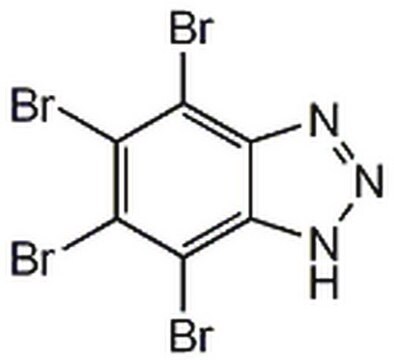T6951
TBBz
≥98% (HPLC), powder
Synonym(s):
4,5,6,7-Tetrabromobenzimidazole
About This Item
Recommended Products
assay
≥98% (HPLC)
form
powder
solubility
DMSO: >10 mg/mL at 60 °C, clear
storage temp.
2-8°C
SMILES string
Brc1c(Br)c(Br)c2[nH]cnc2c1Br
InChI
1S/C7H2Br4N2/c8-2-3(9)5(11)7-6(4(2)10)12-1-13-7/h1H,(H,12,13)
InChI key
LOEIRDBRYBHAJB-UHFFFAOYSA-N
Application
Biochem/physiol Actions
Preparation Note
Storage Class
11 - Combustible Solids
wgk_germany
WGK 3
flash_point_f
Not applicable
flash_point_c
Not applicable
ppe
Eyeshields, Faceshields, Gloves, type P2 (EN 143) respirator cartridges
Certificates of Analysis (COA)
Search for Certificates of Analysis (COA) by entering the products Lot/Batch Number. Lot and Batch Numbers can be found on a product’s label following the words ‘Lot’ or ‘Batch’.
Already Own This Product?
Find documentation for the products that you have recently purchased in the Document Library.
Our team of scientists has experience in all areas of research including Life Science, Material Science, Chemical Synthesis, Chromatography, Analytical and many others.
Contact Technical Service







